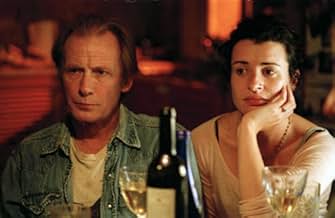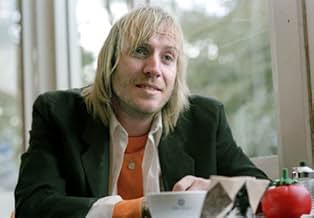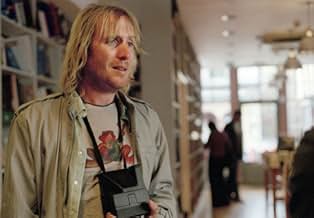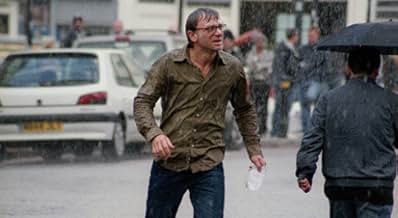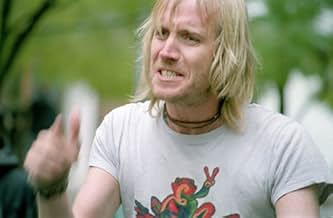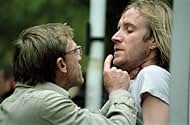IMDb-BEWERTUNG
6,3/10
11.222
IHRE BEWERTUNG
Füge eine Handlung in deiner Sprache hinzuTwo strangers become connected by a tragedy, yet one dangerously feels that the connection goes much deeper than the other is willing to admit.Two strangers become connected by a tragedy, yet one dangerously feels that the connection goes much deeper than the other is willing to admit.Two strangers become connected by a tragedy, yet one dangerously feels that the connection goes much deeper than the other is willing to admit.
- Auszeichnungen
- 4 Gewinne & 12 Nominierungen insgesamt
Jeremy McCurdie
- Boy in Balloon
- (as Jeremy Mccurdie)
Rosie Michell
- Katie Logan
- (as Rosanna Michell)
Empfohlene Bewertungen
'Enduring Love' manages to be grip the viewers attention right from the very beginning. We are given some wonderful shots of the beautiful British landscape at the centre of which there is couple on a picnic. However a hot-air balloon appears to be on the loose and what follows is a terrible accident that effects their lives. 'Enduring Love' is visually impressive mostly due to the excellent cinematography and the background score contributing to the scenes. Penhall's writing is very good (sharp dialogues, unfolding events, well-defined characters) but in the middle it gets a bit slow-paced. The stalker subplot could have been done with less focus (that extra scene during the rolling credits wasn't necessary and the film may have been stronger without it) as it was working better as a movie about Joe and his fragile relationship with Claire. The movie is pretty much character driven and it heavily relies on the performances. Fortunately, this is where 'Enduring Love' scores high. Daniel Craig breathes into a role that seems made for him. He portrays Joe's guilt, confusion, patience and determination with amazing skill. Samantha Morton has less screen time but she is just as good while she gives a beautifully understated performance. Rhys Ifans springs a surprise in remarkably playing a homosexual stalker with Clerambault's syndrome. Bill Nighy and Susan Lynch are adequate in their tiny roles. For me 'Enduring Love' has been a strange movie watching experience but as I thought more about it, I grew to understand and appreciate it more. It does have its flaws as mentioned earlier but it's a good character study and visually interesting.
Having never read Ian McEwan's original novel from which this film is based, I can't rightly judge whether or not this was a successful adaptation. However, I can say that as a standalone work, Enduring Love is one of the more interesting films to be released within the last couple of years and, as a successful British film, is one to rank alongside other recent UK successes like Dead Man's Shoes and Vera Drake. Having watched the film a couple of times, I was left with the urge to go away and discover McEwan's original novel (as was the case when I saw the film adaptation of his other key-work, The Cement Garden), as the film, although highly interesting and emotionally engaging, certainly left me asking a lot of questions.
The opening scene really sets the mood and pace (and of course, the plot) for the rest of the film... not to mention standing as one of the most exciting, engaging and downright jaw-dropping moments of visceral, cinematic tension-building that I've seen in a long time. Here, director Roger Michell juxtaposes the lush greenery of the Oxfordshire countryside - with it's rolling hills and vast, ocean-like sky - with a billowing, blood red, hot-air-balloon, waving as dangerously as the frantic, hand-held cameras that capture the action. The editing is punchy and creates a rhythm that works towards heightening the confusion felt by the characters, as the quiet, countryside picnic of writer/professor Joe and his sculptress girlfriend Claire is disrupted by the sight of the balloon, and the appalling tragedy to come. As the story progresses, the couple try to put the event to the back of their minds and carry on as normal with their comfortable, bourgeois lives of luncheons, dinner-parties & work-related accolades, however, when another one of the witnesses to the event contacts Joe out of the blue, we see the beginnings of a bizarre and dangerous relationship that will push all three protagonists beyond the regular boundaries of reason.
Some have likened the film to something like Fatal Attraction, with the idea of obsession and guilt both featuring as central to both... however, for me, Enduring Love was much more of a treatise on the nature of love, and the whys and wherefores of such. For example, it is important to note that Joe is a professor who studies the nature of love, and the human qualities one would require to endure love, when, in reality, it is the unhinged and unwanted fellow witness Jed that really understands the true sense of blind obsession, so central to such feelings.
The style of the film manages to be both low-key and visually distinctive, with Michell employing a style similar to his previous film, The Mother, with hand-held cameras that offer a reality - but also, manage to convey the wavering uncertainty and voyeuristic intrusion so central to the plot - coupled with staccato editing, optical filters, rich composition and an extraordinary use of locations (all captured in glorious 2:35.1 widescreen). The performances are of an extremely high calibre as well, with Daniel Craig bringing a smug-pomposity, but also a vulnerability to his role of the logical professor pushed to an illogical limit, whilst Samantha Morton offers support as the bewildered Claire, who has to question Joe's mental stability as he begins obsessing about the accident and his newly acquired "friend". However, much more impressive, if only for the fact that he delivers a performance completely against every other role I've ever seen him attempt, is Rhys Ifans, who embodies the lonely and perhaps somewhat disturbed Jed with a quiet, contemplative spirit that goes against the kind of melodramatic, raving lunatics found in similar, Hollywood endeavours.
The interplay between the three characters is wonderfully handled by Michell, who paces the film deliberately, so that the relationships only becomes truly apparent over a gradual period of time. Now, this may infuriate some viewers who expect a much quicker film that gets straight to the point, but I for one admired the gradual build and felt that it made the relationship between Joe and Jed much more metaphysical (bringing up all kinds of questions about fragmented personalities, two-halves of the same soul, repressed guilt, angst, sexual frustration and schizophrenia), whilst also forcing us to question who is really insane? This is just one question that the film left me with as the credits began to roll, with Michell and screenwriter Joe Penhall leaving a lot of minor-details unresolved, thus, allowing the audience to fill in the blanks. Again, this may annoy some viewers... and I must admit, I myself was left scratching my head on a number of occasions (not least, the scene that takes place after the final credits), but having gone back and watched the film a second time you realise that so much of the emotional background and the character motivation is there in those great performances.
It's certainly a film that will leave you with something to think about, if not only the relationship between the characters, then certainly the rationality of them leading up to that tense, edge-of-the-seat final. For me, Enduring Love was a great film that kept me interested throughout and left me with a lot of questions that have been running through my mind over the last couple of weeks. I appreciate the fact that a lot of viewers seek some kind of emotional resolution from a film, but I feel that people who don't necessarily expect every single loose end to be neatly tucked away by the end credits - or those that enjoy thinking about both the characters and the story once the film has come to a close - will certainly enjoy and appreciate this.
The opening scene really sets the mood and pace (and of course, the plot) for the rest of the film... not to mention standing as one of the most exciting, engaging and downright jaw-dropping moments of visceral, cinematic tension-building that I've seen in a long time. Here, director Roger Michell juxtaposes the lush greenery of the Oxfordshire countryside - with it's rolling hills and vast, ocean-like sky - with a billowing, blood red, hot-air-balloon, waving as dangerously as the frantic, hand-held cameras that capture the action. The editing is punchy and creates a rhythm that works towards heightening the confusion felt by the characters, as the quiet, countryside picnic of writer/professor Joe and his sculptress girlfriend Claire is disrupted by the sight of the balloon, and the appalling tragedy to come. As the story progresses, the couple try to put the event to the back of their minds and carry on as normal with their comfortable, bourgeois lives of luncheons, dinner-parties & work-related accolades, however, when another one of the witnesses to the event contacts Joe out of the blue, we see the beginnings of a bizarre and dangerous relationship that will push all three protagonists beyond the regular boundaries of reason.
Some have likened the film to something like Fatal Attraction, with the idea of obsession and guilt both featuring as central to both... however, for me, Enduring Love was much more of a treatise on the nature of love, and the whys and wherefores of such. For example, it is important to note that Joe is a professor who studies the nature of love, and the human qualities one would require to endure love, when, in reality, it is the unhinged and unwanted fellow witness Jed that really understands the true sense of blind obsession, so central to such feelings.
The style of the film manages to be both low-key and visually distinctive, with Michell employing a style similar to his previous film, The Mother, with hand-held cameras that offer a reality - but also, manage to convey the wavering uncertainty and voyeuristic intrusion so central to the plot - coupled with staccato editing, optical filters, rich composition and an extraordinary use of locations (all captured in glorious 2:35.1 widescreen). The performances are of an extremely high calibre as well, with Daniel Craig bringing a smug-pomposity, but also a vulnerability to his role of the logical professor pushed to an illogical limit, whilst Samantha Morton offers support as the bewildered Claire, who has to question Joe's mental stability as he begins obsessing about the accident and his newly acquired "friend". However, much more impressive, if only for the fact that he delivers a performance completely against every other role I've ever seen him attempt, is Rhys Ifans, who embodies the lonely and perhaps somewhat disturbed Jed with a quiet, contemplative spirit that goes against the kind of melodramatic, raving lunatics found in similar, Hollywood endeavours.
The interplay between the three characters is wonderfully handled by Michell, who paces the film deliberately, so that the relationships only becomes truly apparent over a gradual period of time. Now, this may infuriate some viewers who expect a much quicker film that gets straight to the point, but I for one admired the gradual build and felt that it made the relationship between Joe and Jed much more metaphysical (bringing up all kinds of questions about fragmented personalities, two-halves of the same soul, repressed guilt, angst, sexual frustration and schizophrenia), whilst also forcing us to question who is really insane? This is just one question that the film left me with as the credits began to roll, with Michell and screenwriter Joe Penhall leaving a lot of minor-details unresolved, thus, allowing the audience to fill in the blanks. Again, this may annoy some viewers... and I must admit, I myself was left scratching my head on a number of occasions (not least, the scene that takes place after the final credits), but having gone back and watched the film a second time you realise that so much of the emotional background and the character motivation is there in those great performances.
It's certainly a film that will leave you with something to think about, if not only the relationship between the characters, then certainly the rationality of them leading up to that tense, edge-of-the-seat final. For me, Enduring Love was a great film that kept me interested throughout and left me with a lot of questions that have been running through my mind over the last couple of weeks. I appreciate the fact that a lot of viewers seek some kind of emotional resolution from a film, but I feel that people who don't necessarily expect every single loose end to be neatly tucked away by the end credits - or those that enjoy thinking about both the characters and the story once the film has come to a close - will certainly enjoy and appreciate this.
Enduring Love is complex psychologically, and treads grounds that attempt to expose the nature of post traumatic experience, and the important issue of obsession. There's a cruel irony here, as one man's obsession upon another man, an almost incomprehensible assault that must have its true source in mental illness (rather than the tragedy that binds these characters), in turn tragically becomes an obsession for the victim, as he struggles in vain to understand this unwanted attention in a most British and gentlemanly way. It exposes to a great extent just how vulnerable social conventions can be in the way Englishmen interact with each other. I found it interesting that this nightmare may have been mitigated had the victim's de facto/bed partner (another aspect of the swirling psychologies) been just a tad more supportive. Is that the feminine side of Englishness? Grow a backbone, you find the solution, you're the man? This is the sort of movie that Uni students could write papers on and discuss for hours. It was engrossing, to be sure, but I'm an Australian and thus docked it a couple of points for being infuriating. Part of the soundtrack has a beautiful classical, pastoral melody. Other parts, those of tightened tension, are more severe. I wondered if two composers were employed for this. At its core this movie has a huge heart, is a showcase for wonderful actors, is high quality, and surely must have been one of the best and most interesting movies of its year.
(since antirealist already beat me to the first...)
Oddly, I happen to be the person who asked Michell why he chose to use a hand-held camera on Saturday, and his initial response ("Why not?") was a bit flippant, but at the same time, I'm guessing the filmmakers weren't intending to give anything other than glib answers to the puffball questions they were expecting. (When asked if they felt the film perpetuated the negative stereotype of the mentally ill being violent, director Michell dismissed the allegation out of hand before Rhys Ifans stepped in with a quick-hit one-liner about being "completely sane, but I'm feeling a bit violent about that question." That should do it for intelligent discourse at THIS Q&A, thank you...)
The camera-work is a bit distracting, not necessarily because it's hand-held but because the reason for it -- which Michell did say was to represent a first person POV -- is so obvious. In particular, there are a few scenes in which the camera sneaks around behind walls and windows to catch a better view of the characters that screams "you're being watched," which generally sums up my main concern about the film: it telegraphs almost everything.
For a psychological thriller, it isn't nearly as taut or unpredictable as it needs to be. It also lags notably between plot points, content to bleed off any steam it may have picked up from a previous scene. Part of this problem could be caused by the trailer's reliance on exposing nearly every twist in the film, and part of it could be on the film's overuse of "thriller music" that, in the cut I saw, nearly overpowered all five senses every time it appeared in the mix.
However, the acting is generally impressive, yet understated. Daniel Craig does a wonderful job at portraying the complexities of a rational man who comes unhinged in the aftermath of a bizarre accident and the resultant stalker he's burdened with. And there was at least one twist that made me jump, so all is not lost on the tension front.
Last thought: I was stunned by the film's equation of homosexuality, theology and mental illness. I'm not sure what exact conclusion it (or the book) is trying to come to, but I'm guessing the post-screening Q&A wasn't the place to bring it up...
Oddly, I happen to be the person who asked Michell why he chose to use a hand-held camera on Saturday, and his initial response ("Why not?") was a bit flippant, but at the same time, I'm guessing the filmmakers weren't intending to give anything other than glib answers to the puffball questions they were expecting. (When asked if they felt the film perpetuated the negative stereotype of the mentally ill being violent, director Michell dismissed the allegation out of hand before Rhys Ifans stepped in with a quick-hit one-liner about being "completely sane, but I'm feeling a bit violent about that question." That should do it for intelligent discourse at THIS Q&A, thank you...)
The camera-work is a bit distracting, not necessarily because it's hand-held but because the reason for it -- which Michell did say was to represent a first person POV -- is so obvious. In particular, there are a few scenes in which the camera sneaks around behind walls and windows to catch a better view of the characters that screams "you're being watched," which generally sums up my main concern about the film: it telegraphs almost everything.
For a psychological thriller, it isn't nearly as taut or unpredictable as it needs to be. It also lags notably between plot points, content to bleed off any steam it may have picked up from a previous scene. Part of this problem could be caused by the trailer's reliance on exposing nearly every twist in the film, and part of it could be on the film's overuse of "thriller music" that, in the cut I saw, nearly overpowered all five senses every time it appeared in the mix.
However, the acting is generally impressive, yet understated. Daniel Craig does a wonderful job at portraying the complexities of a rational man who comes unhinged in the aftermath of a bizarre accident and the resultant stalker he's burdened with. And there was at least one twist that made me jump, so all is not lost on the tension front.
Last thought: I was stunned by the film's equation of homosexuality, theology and mental illness. I'm not sure what exact conclusion it (or the book) is trying to come to, but I'm guessing the post-screening Q&A wasn't the place to bring it up...
The great music score, cinematography and acting makes it good, if not great. Great is tough to reach, and much like the balloon in the story it goes too high and slips out of our grasp. Ian Mcewan has written excellent novels, Atonement being a highlight, but this one just tries to achieve too much and doesn't have the meat in the characters to back it up. However, it does make you think, and sometimes squirm with its observations and insights. I saw this as more an existentialist drama than a thriller, though the Hollywood crazy stalker plot point was probably enlarged to keep it entertaining, but it was the quieter and more introspective moments that caught my interest. Daniel Craig does a terrific job of playing a man obsessed with looking for a seemingly impossible to find answer to the mysteries of the randomness of life and death. Rhys Ifans plays the truly unique character and his creepy viewpoint makes you shift in your seat. It's consistently engaging but never a masterpiece, it's takes the loud and angry showdown rather than the quiet thinking that made it work to start. Will still make you never look at a hot air balloon the same way again.
Wusstest du schon
- WissenswertesJed (Rhys Ifans) can be seen in the background of many scenes, most notably the art gallery, where he exits to the right promptly.
- SoundtracksGod Only Knows
Written by Brian Wilson & Tony Asher
Published by Rondor Music London Ltd on behalf of Sea of Tunes Pub. Co.
Top-Auswahl
Melde dich zum Bewerten an und greife auf die Watchlist für personalisierte Empfehlungen zu.
- How long is Enduring Love?Powered by Alexa
Details
Box Office
- Bruttoertrag in den USA und Kanada
- 358.362 $
- Eröffnungswochenende in den USA und in Kanada
- 34.610 $
- 31. Okt. 2004
- Weltweiter Bruttoertrag
- 1.875.649 $
- Laufzeit
- 1 Std. 40 Min.(100 min)
- Farbe
- Sound-Mix
- Seitenverhältnis
- 2.35 : 1
Zu dieser Seite beitragen
Bearbeitung vorschlagen oder fehlenden Inhalt hinzufügen


